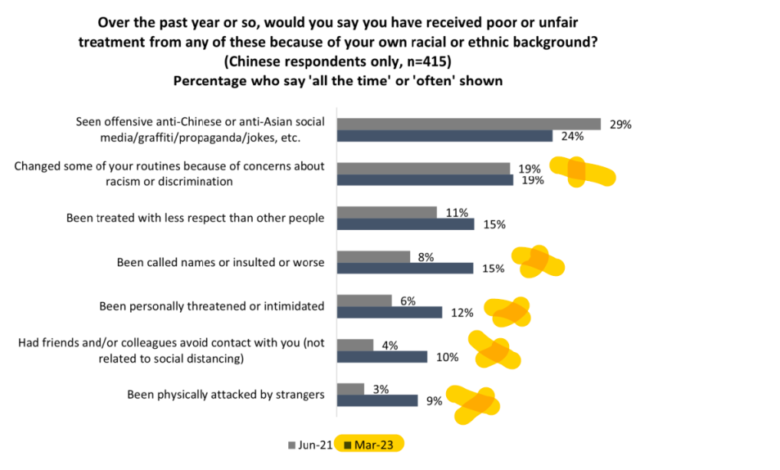Anti-Asian hate is on the rise in Canada: study

Asian Canadians report continued assault and harassment in Canada, mainly due to political tension and COVID-19, a new poll shows.
The Survey, released July 12, polled 884 Asian Canadians from a variety of backgrounds including Chinese and other East Asians, Filipino and Southeast Asian and South Asian and 1,625 other Canadians who are not of that background.
Completed by the Angus Reid Institute and the Canadian Race Relations Foundation, it shows that many will face continued abuse, harassment and mistreatment in 2023.
As a result of the COVID-19 pandemic, many Asian Canadians have faced a wave of hatred and discrimination, but the data shows that as those tensions ease, other political factors perpetuate the mistreatment.
In recent years, Canada has had a rocky relationship with China in particular, including trade disputes, allegations of election interference, the arrest of Canadians Michael Kovrig and Michael Spavor and Canada’s detention of Huawei’s CFO Meng Wanzhou.
“A consequence of this appears to be the poor treatment of Asian Canadians in Canada,” the report states.
“One in five Chinese and East Asian Canadians say they have regularly experienced negative reactions from other Canadians due to the political tensions between the Canadian and Chinese governments.”
The data shows that about 20 percent say harassment has happened “repeatedly.”
UNTREATMENT TO RISE IN 2023
Angus Reid completed a separate poll of a similar nature in 2021 and when we compare that to 2023, negative treatment of Asian Canadians appears to be on the rise, particularly for Chinese Canadians.
In 2021, Chinese-Canadian respondents said they experience negative reactions from other Canadians all the time (four percent) or often (11 percent). In 2023, these categories have each increased by three and one percentage point.
Chinese Canadians will report more name calling and insults, personal threats or harassment, instances of friends or colleagues avoiding contact with them and being physically assaulted by strangers in 2023 compared to 2021.
 The percentage of Chinese Canadians who see offensive material on social media, on graffiti around their community or in other places has declined marginally compared to 2021, the percentage reporting disrespect or abuse in other forms has largely increased. (Angus Reid Institute)
The percentage of Chinese Canadians who see offensive material on social media, on graffiti around their community or in other places has declined marginally compared to 2021, the percentage reporting disrespect or abuse in other forms has largely increased. (Angus Reid Institute)
Of all Asian Canadians who responded in 2023, South Asians (28 percent) were more likely to report abuse or discrimination.
In the past year, about 22 percent of Chinese and other East Asian Canadians have seen offensive media, graffiti, propaganda or jokes.
South Asian Canadians reported being treated with less respect in the past year and feared the most for the safety of their friends and family.
IS IT GETTING BETTER OR WORSE?
When asked specifically whether discrimination and racism are getting better or worse, more Asian Canadians agreed that the past year (in 2022 and 2023) was worse.
About 42 percent of the general population said racism “has stayed the same”, while 46 percent of Asian Canadians said it “got worse”.
Despite Asian Canadians agreeing that more needs to be done about discrimination in Canada, the general population believes the opposite, according to the poll.
When asked “to what extent do you consider racism and discrimination against Asians in general to be a problem in Canada today?” about 45 percent of the general population said it was a problem in 2023 “among others here”.
This is a drop from the priority of 48 percent in 2021.
For Asian Canadians, the problem has shifted, showing that 56 percent in 2023 – compared to 53 percent in 2021 – believe Asian hate is an “among others here” problem in Canada.
RACISM EXISTS EVERYWHERE
While many Canadians believe that Asian hate is a problem in Canada, they think it is less of a problem within their own communities.
In 2023, about 26 percent said racism against Asians in their community was a problem, in 2021 this was 30 percent.
But Asian Canadians responded in 2023 and 2021 (33 percent), both saying it remained a problem in their communities.
“Regions with higher levels of Asian-Canadian representation (Ontario and British Columbia) are more likely to raise concerns about discrimination in their own province,” the report said.
About half (51 percent) of all respondents in BC said racism is a problem in the province, followed by 41 percent in Quebec and 39 percent in Ontario.
About 40 percent of people in Manitoba said it was a minor problem.
When it comes to taking action against hate, the majority of Asian Canadians do not report it to the police.
About 39 percent don’t tell anyone about a negative experience, while 31 percent tell someone close to them.
This is in line with how Asian Canadians feel about the experience, with 38 percent saying the situation “remains” with them. This is higher for younger Asian Canadians, with 40 percent saying an experience is upsetting and stays with them.
While racism and discrimination continue to affect Asian Canadians and other racialized minorities, Canadians generally see the value of a diverse population.
“More than four in five (86 percent) say Canada’s multicultural population represents a strength rather than a weakness,” the report said.
—————-
Methodology
The general population sample, the Asian-Canadian sample, and the Chinese-only sample are all weighted by census demographics. Chinese and other East Asian (combined), South Asian, and Southeast Asian samples are nearly evenly distributed by age, gender, and other demographics, but not weighted by the census.




